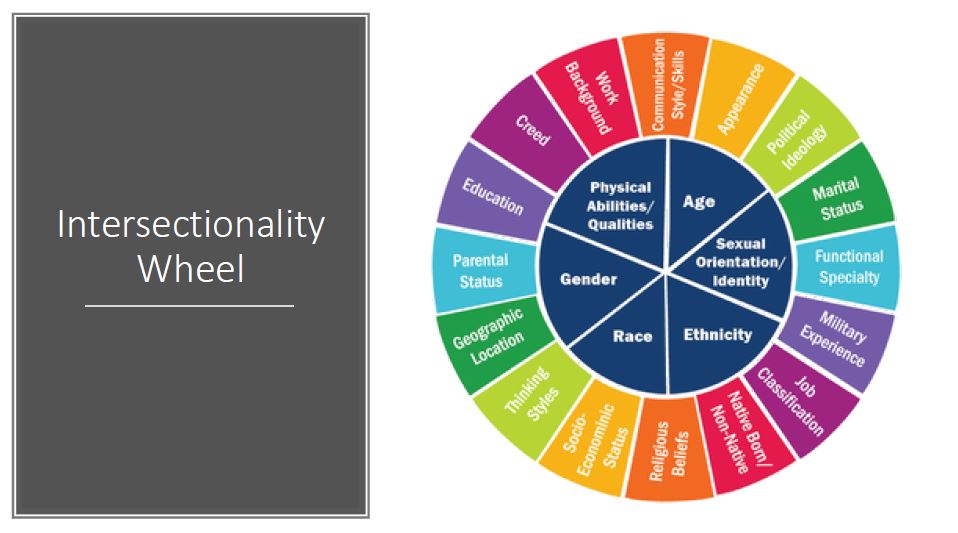Definition
Intersectionality refers to the interaction between gender, race, and other categories of difference in individual lives, social practices, institutional arrangements, and cultural ideologies and the outcomes of these interactions in terms of power (Davis 2008, p. 68).
-
Credo Reference This link opens in a new window

Credo Reference is an easy-to-use tool for starting research. Gather background information on your topic from hundreds of full-text encyclopedias, dictionaries, thesauri, quotations, and subject-specific titles, as well as 500,000+ images and audio files and over 1,000 videos.
What is Intersectionality?
Books
Intersectionality
Intersectionality theory has emerged over the past thirty years as a way to think about the avenues by which inequalities (most often dealing with, but not limited to, race, gender, class and sexuality) are produced. Rather than seeing such categories as signaling distinct identities that can be adopted, imposed or rejected, intersectionality theory considers the logic by which each of these categories is socially constructed as well as how they operate within the diffusion of power relations. In other words, social and political power are conferred through categories of identity, and these identities bear vastly material effects. Rather than look at inequalities as a relationship between those at the center and those on the margins, intersectionality maps the relative ways in which identity politics create power. Though intersectionality theory has emerged as a highly influential school of thought in ethnic studies, gender studies, law, political science, sociology and psychology, no scholarship to date exists on the evolution of the theory. In the absence of a comprehensive intellectual history of the theory, it is often discussed in vague, ahistorical terms. And while scholars have called for greater specificity and attention to the historical foundations of intersectionality theory, their idea of the history to be included is generally limited to the particular currents in the United States. This book seeks to remedy the vagueness and murkiness attributed to intersectionality by attending to the historical, geographical, and cross-disciplinary myopia afflicting current intersectionality scholarship. This comprehensive intellectual history is an agenda-setting work for the theory.
Black Feminism Reimagined
Jennifer C. Nash reframes black feminism's engagement with intersectionality, contending that black feminists should let go of their possession and policing of the concept in order to better unleash black feminist theory's visionary and world-making possibilities.
Intersectionality
The concept of intersectionality has become a hot topic in academic and activist circles alike. But what exactly does it mean, and why has it emerged as such a vital lens through which to explore how social inequalities of race, class, gender, sexuality, age, ability and ethnicity shape one another? In this new book Patricia Hill Collins and Sirma Bilge provide a much-needed, introduction to the field of intersectional knowledge and praxis. They analyze the emergence, growth and contours of the concept and show how intersectional frameworks speak to topics as diverse as human rights, neoliberalism, identity politics, immigration, hip hop, global social protest, diversity, digital media, Black feminism in Brazil, violence and World Cup soccer. Accessibly written and drawing on a plethora of lively examples to illustrate its arguments, the book highlights intersectionality's potential for understanding inequality and bringing about social justice oriented change. Intersectionality will be an invaluable resource for anyone grappling with the main ideas, debates and new directions in this field.
Intersectionality Wheel
Podcast
-
Intersectionality Matters!Intersectionality Matters! is a podcast hosted by Kimberlé Crenshaw, an American civil rights advocate and a leading scholar of critical race theory.
The Urgency of Intersectionalitiy
-
The Urgency of IntersectionalitiyNow more than ever, it's important to look boldly at the reality of race and gender bias -- and understand how the two can combine to create even more harm. Kimberlé Crenshaw uses the term "intersectionality" to describe this phenomenon; as she says, if you're standing in the path of multiple forms of exclusion, you're likely to get hit by both. In this moving talk, she calls on us to bear witness to this reality and speak up for victims of prejudice.
